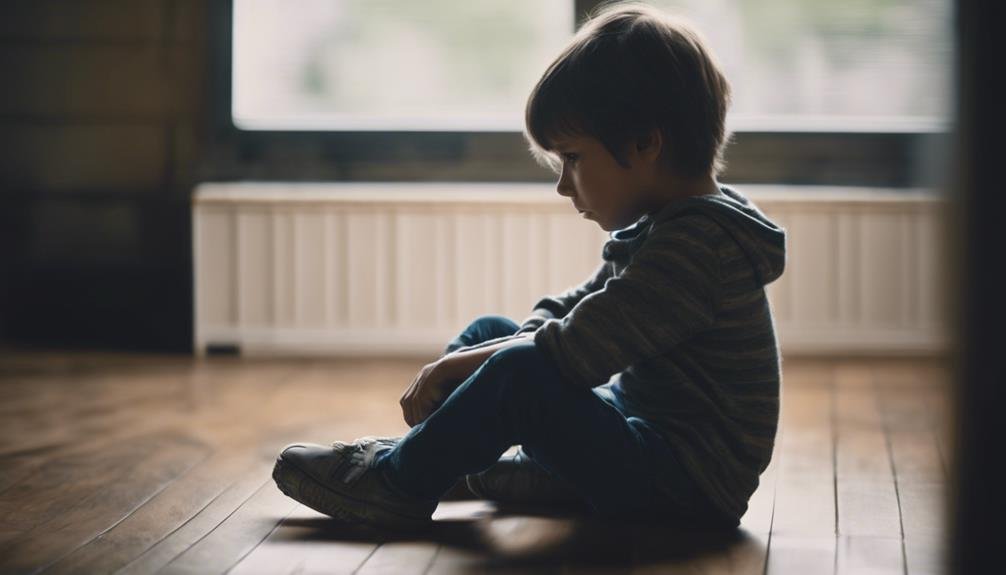Domestic violence deeply affects children’s behavior. You’ll notice emotional instability and mood swings due to fear and stress. Aggressive behavior may emerge, as managing anger becomes challenging. Trusting relationships might be hard to form, shaping skepticism and guarded behavior. Academic struggles and social challenges are common, impacting their performance and interactions. Lastly, children internalize emotional pain, leading to psychological distress. Understanding these impacts is essential in supporting children through these difficulties.
Key Takeaways
- Witnessing violence leads to anxiety, fear, and erratic behavior in children.
- Aggressive tendencies are learned coping mechanisms from observing violence.
- Children struggle with forming trusting relationships due to fear and uncertainty.
- Academic challenges arise from emotional distress and hindrance in social interactions.
- Domestic violence leads to internalizing emotional pain and trauma, affecting development and coping mechanisms.
Emotional Instability and Mood Swings
Experiencing domestic violence can lead to emotional instability and mood swings in children, impacting their behavior and overall well-being. Children exposed to domestic violence often face a whirlwind of emotions, ranging from fear to stress due to the unpredictability of their environment.
Witnessing violence at home can leave them feeling anxious, scared, and unsure of how to process their feelings, resulting in mood swings and erratic behavior.
The constant stress and fear that come with domestic violence can weigh heavily on a child’s emotional development, leading to difficulties in regulating their emotions. This emotional instability may manifest as sudden mood changes and outbursts, making it challenging for children to express themselves in a healthy manner.
The disruption caused by domestic violence can create a turbulent internal world for these children, affecting how they interact with others and navigate their own emotions. It’s important to provide support and resources to help children cope with the emotional turmoil they experience in such situations.
Aggressive Behavior and Acting Out
Children exposed to domestic violence often exhibit aggressive behavior and act out as a result of the stress and trauma they endure in their environment. The significance of witnessing violence at home can lead these children to struggle with managing their anger and controlling their impulses. This can manifest in behaviors such as fighting, bullying, and defiance towards authority figures and peers. Studies have shown that these children may imitate aggressive behaviors they witness, using them as coping mechanisms in response to the chaos and fear they experience.
Understanding the root of these actions is vital in providing support and intervention for these children. By addressing their underlying stress and trauma, as well as teaching healthy ways to manage their emotions, caregivers and professionals can help them navigate their aggressive tendencies. Encouraging positive outlets for expression and providing tools for anger management can assist these children in developing healthier behaviors and responses to their environment.
Difficulty in Forming Trusting Relationships
Struggling to form trusting relationships, individuals exposed to domestic violence often face challenges in developing a sense of security and safety in their interactions with others. Children exposed to domestic violence may carry deep trust issues, stemming from the fear and uncertainty that characterized their early experiences.
Witnessing violence at home can lead these children to believe that relationships are inherently unsafe and unpredictable. This skepticism can hinder their ability to form secure connections with peers and caregivers, impacting their social interactions and ability to confide in others.
The difficulty in forming trusting relationships can manifest in guarded behavior and reluctance to establish close bonds. These children may exhibit a general wariness in forming new relationships, fearing vulnerability and potential hurt.
Helping them navigate these trust issues and providing a safe environment for building connections is essential in supporting their emotional well-being and fostering healthy relationships in the future.
Academic and Social Performance Challenges
In the wake of domestic violence, individuals often face significant hurdles in their academic and social performance. Children who witness domestic violence may encounter academic challenges such as increased absenteeism and difficulty focusing in school due to the emotional distress they experience.
The psychological trauma from exposure to domestic violence can also impact their social interactions, making it hard for them to form and maintain healthy relationships with peers and teachers.
The constant worry about safety and emotional distress can hinder their academic performance, leading to stress and behavioral issues that further affect their social and academic functioning. Research indicates that these children are at a higher risk of dropping out of school, highlighting the significant impact of domestic violence on their educational journey.
Understanding these challenges is essential in providing the necessary support and interventions to help children navigate through the academic and social difficulties they face as a result of domestic violence.
Internalizing Emotional Pain and Trauma

Experiencing domestic violence can lead to internalizing emotional pain and trauma, manifesting in various psychological challenges for individuals, particularly in their ability to process and express emotions effectively.
Children exposed to domestic violence may internalize the emotional distress they witness, resulting in anxiety, depression, and post-traumatic stress disorder. This internalization of trauma can disrupt their emotional development, making it difficult for them to form healthy relationships and navigate social interactions.
The impact of domestic violence on children’s behavior can be profound, leading to struggles with expressing and understanding emotions, which, in turn, affects their overall well-being. Coping challenges often arise as a result of this internalized pain, leaving children vulnerable to ongoing emotional struggles.
Addressing these internalized emotional wounds is essential in helping children heal and develop the necessary skills to cope with the trauma they’ve endured.
Frequently Asked Questions
How Violence Affects Children’s Development?
When violence affects children’s development, emotional growth, cognitive abilities, social interactions, academic success, coping skills, self-worth, aggression, anxiety, trust, and PTSD symptoms are impacted. Providing support, therapy, and stability can help mitigate these effects.
How Does Abuse Affect Children?
You may struggle with emotional regulation, trust issues, and aggression control. Anxiety symptoms can be overwhelming, affecting your social skills and self-esteem. Academic performance might suffer, and your coping mechanisms and communication patterns could be impacted.
What Are the Effects of Witnessing Domestic Violence on Children a Systematic Review?
Witnessing domestic violence can have lasting effects on you. It can lead to psychological impacts, affecting your social interactions, academic performance, and emotional regulation. You may develop trust issues, struggle with attachment styles, self-esteem, and aggressive tendencies.
What Are the Behavioral Effects of Violence?
You struggle with aggressive tendencies, trust issues, anxiety symptoms, social withdrawal, emotional instability, academic struggles, self-esteem issues, PTSD symptoms, attachment problems, and behavioral challenges. These effects of violence shape your behavior and need compassionate support.
Conclusion
As you navigate the tumultuous waters of childhood shaped by domestic violence, remember that you’re like a fragile flower struggling to bloom in a storm.
Your emotions may sway like branches in the wind, but your resilience is a reflection of your strength.
Seek support, nurture trust, and never forget that the scars you carry don’t define you.
Embrace your journey with courage and compassion, for the light of healing awaits at the end of the tunnel.






